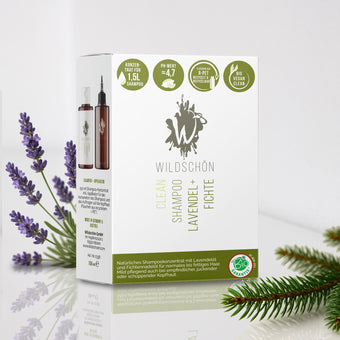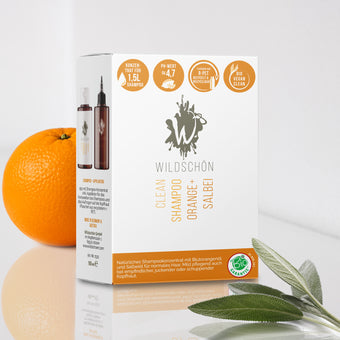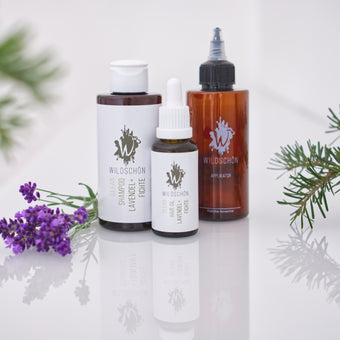Why we don't use glycerin in our shampoos
- Glycerin is used technically as a humectant and preservative.
- It should also keep skin and hair moist and supple.
- There are still very good reasons against glycerin in shampoos - find out more here!
You have probably read the word many times when you looked at the list of ingredients in cosmetic products or shampoos: glycerin. Glycerin is one of the most used ingredients in cosmetics. It is classified as harmless and allowed in natural cosmetics as long as it comes from the right source - but more on that below. Glycerin is an odorless and colorless trivalent alcohol with a sweet taste. It is also often referred to as glycerol. With this designation, the chemical affiliation to the world of alcohols becomes even clearer. In your wine, for example, ethanol provides the Schwipps factor. But where does glycerin come from and what is it used for?
How is glycerin made?
Most of the industrially produced glycerine is synthetically obtained from propylene, a by-product of petroleum chemistry. In rare cases, however, it can also be obtained by other methods of splitting animal or vegetable fats into glycerol and fatty acids. This is where a large proportion of the glycerine available on the market is produced in biodiesel production. For natural cosmetics manufacturers, glycerine from plant production is of course the right ingredient, because petroleum-based ingredients are not permitted here. Nevertheless, the production is associated with negative consequences, because biodiesel production is anything but uncontroversial: Critics primarily point out the fact that valuable food crops are no longer used for food production and the resulting monocultures and end products can harm biodiversity and the climate . The topic is complex, so we don't want to go into it any further here - but you can find numerous sources on the Internet for the current status of the discussion.
What is the function of glycerin in cosmetics and hair care?
Glycerine is often used in cosmetics because it can bind moisture: Glycerine loves water, so it is hygroscopic. It is used in many products to prevent them from drying out: the glycerine practically holds the water in the product. So technically it is a humectant. If you leave the lid of a product open, it is less likely that unsightly crusts will form on the product. Manufacturers also use glycerine as a preservative, because products with a high water content are susceptible to germs - germs also love water ( this is why we use concentrates ). And as you probably know: alcohol preserves. The technical properties of glycerin are far more important to most manufacturers than the skin care properties that we present to you in the next paragraph.
Does glycerin moisturize the skin?
Glycerine is also supposed to take over the moisturizing function on the skin and in the hair: if the right environmental conditions are present, it should keep the moisture on the skin or in the hair and thus preserve the elasticity and strengthen the skin barrier. It is therefore mainly used in shampoos that dry out the skin due to harsh surfactants. As you can read here: Surfactants are the substances in shampoos that have a cleaning effect and dissolve grease and dirt . Some surfactants - especially those in conventional hair care - lead to severe drying of the skin. In order to counteract this mechanism, the glycerin is supposed to draw moisture from the air or from the care components (e.g. hyaluronic acid) of the shampoo and bind it to the skin and hair. In order for it to be able to fulfill this function, the glycerin content in the product must not be too high compared to the moisturizing ingredients.
Why don't we use glycerin?
Since we use particularly mild sugar surfactants, it is not necessary to add glycerine at first, because our shampoos draw much less moisture from the skin. The high-quality vegetable oils in our shampoos also support moisture regulation in a natural way. We also have no use for the technical properties of glycerine, because our concentrates do well without humectants and preservatives. Now you might be thinking: nevertheless, more moisture is better than less. That's true, of course, but actually glycerin doesn't bring more moisture into or onto your skin and hair in all environments. Alcohol is so attractive to water that it greedily draws moisture from its surroundings. When the humidity is very high, it simply extracts the water from the air or from the care ingredients in the shampoo. However, if the humidity is high, your skin can do this itself, or better: it doesn't dry out in the first place. And most of the care ingredients are removed from the hair when the shampoo is washed out – as is the glycerin itself, by the way. The benefit is therefore comparatively small.
When the humidity is low, glycerin can draw moisture from the skin
The situation is different when the air humidity is low: Then the glycerin even tends to draw moisture out of the skin cells. In some cases, dermatologists even recommend using humidifiers when using cosmetic products containing glycerin. The deeper layers of the skin are of course constantly supplied with moisture again by the blood circulation and processes in the connective tissue, but in our experience glycerin can have undesirable effects, especially on the upper layers of the skin and the skin barrier. The reason: your skin has a finely tuned regulatory system that can be disturbed by the addition of external moisturizers - it gets used to the product, just as you might know it from fat sticks for the lips. The Wildschön concept, on the other hand, aims to support and maintain your skin's natural ability to regulate over the long term.









